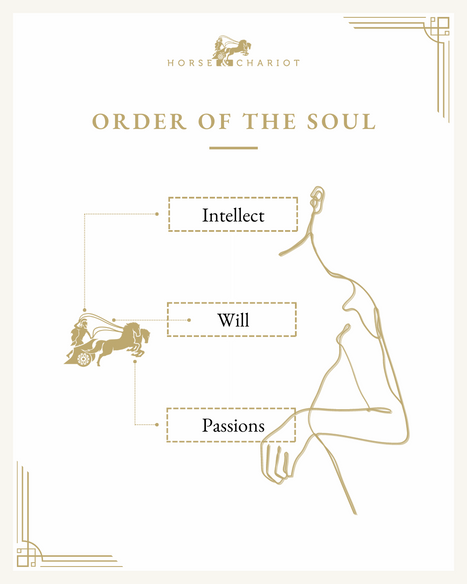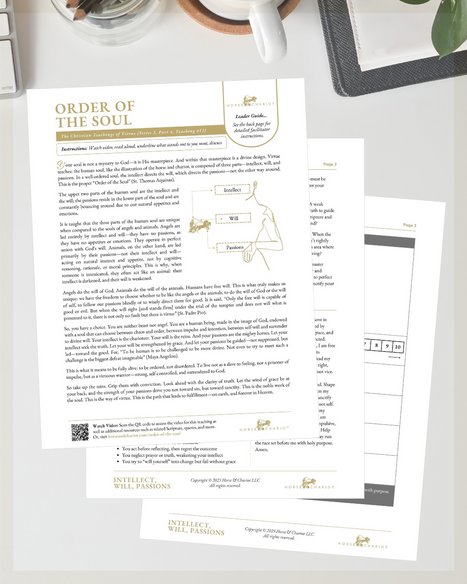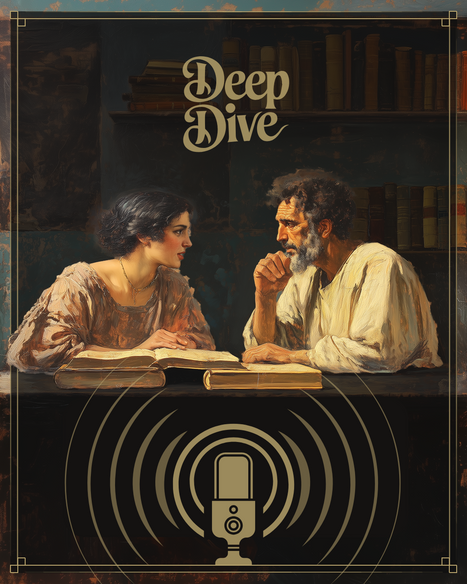All Series > Well-Ordered Soul > Part 4
Order of the Soul
(Series 2, Part 4, Teaching #12)
Watch: On YouTube
Order of the Soul
Your soul is not a mystery to God—it is His masterpiece. And within that masterpiece is a divine design. Virtue teaches: the human soul, like the illustration of the horse and chariot, is composed of three parts—intellect, will, and passions. In a well-ordered soul, the intellect directs the will, which directs the passions—not the other way around. This is the proper “Order of the Soul” (St. Thomas Aquinas).
The upper two parts of the human soul are the intellect and the will; the passions reside in the lower part of the soul and are constantly bouncing around due to our natural appetites and emotions.
It is taught that the three parts of the human soul are unique when compared to the souls of angels and animals. Angels are led entirely by intellect and will—they have no passions, as they have no appetites or emotions (such as hunger, lust, or rage in the human sense). They operate in perfect union with God's will. Animals, on the other hand, are led primarily by their passions—not their intellect and will—acting on natural instinct and appetite, not by cognitive reasoning, rationale, or moral principles. This is why, when someone is intoxicated, they often act like an animal: their intellect is darkened, and their will is weakened.
Angels do the will of God. Animals do the will of the animals. Humans have free will. This is what truly makes us unique: we have the freedom to choose whether to be like the angels or the animals, to do the will of God or the will of self, to follow our passions blindly or to wisely direct them for good. It is said, “Only the free will is capable of good or evil. But when the will sighs [and stands firm] under the trial of the tempter and does not will what is presented to it, there is not only no fault but there is virtue” (St. Padre Pio).
So, you have a choice. You are neither beast nor angel. You are a human being, made in the image of God, endowed with a soul that can choose between chaos and order, between impulse and intention, between self-will and surrender to divine will. Your intellect is the charioteer. Your will is the reins. And your passions are the mighty horses. Let your intellect seek the truth. Let your will be strengthened by grace. And let your passions be guided—not suppressed, but led—toward the good. For, “To be human is to be challenged to be more divine. Not even to try to meet such a challenge is the biggest defeat imaginable” (Maya Angelou).
This is what it means to be fully alive: to be ordered, not disordered. To live not as a slave to feeling, nor a prisoner of impulse, but as a virtuous warrior—strong, self-controlled, and surrendered to God.
So take up the reins. Grip them with conviction. Look ahead with the clarity of truth. Let the wind of grace be at your back, and the strength of your passions drive you not toward sin, but toward sanctity. This is the noble work of the soul. This is the way of virtue. This is the path that leads to fulfillment—on earth, and forever in Heaven.

Scroll down for the lesson plan and other related resources associated with this teaching.
Copyright © 2022 Horse & Chariot. All rights reserved.
New teachings like this are released often. Subscribe free and never miss a teaching!
Resources

Visual Resource
Illustration of a well-ordered soul, where the intellect directs the will, which directs the passions.

Free Lesson Plan
Perfect for small groups, families, classrooms, or personal reflection.

5-Minute Deep Dive
Deepen your understanding of this source teaching by listening to a brief podcast-style discussion (powered by Google Gemini).
Related Scripture
“Set your minds on the things that are above, not on the things that are on earth.” — Colossians 3:2 (NRSVue)
“To set the mind on the flesh is death, but to set the mind on the Spirit is life and peace.” — Romans 8:6 (NRSVue)
“Beloved, do not imitate what is evil, but imitate what is good. Whoever does good is from God; whoever does evil has not seen God.” — 3 John 1:11 (NRSVue)
“Will you gain anything if you win the whole world but lose your life? Of course not! There is nothing you can give to regain your life.” — Matthew 16:26 (GNT)
“The word of God is alive and active, sharper than any double-edged sword. It cuts all the way through, to where soul and spirit meet, to where joints and marrow come together. It judges the desires and thoughts of the heart.” — Hebrews 4:12 (GNT)
“Therefore, put away all filth and evil excess and humbly welcome the word that has been planted in you and is able to save your souls.” — James 1:21 (NABRE)
“And Mary said, ‘My soul magnifies the Lord’…” — Luke 1:46 (NRSVue)
“Why are you cast down, O my soul, and why are you disquieted within me? Hope in God, for I shall again praise him, my help.” — Psalm 42:5 (NRSVue)
“Restore to me the joy of your salvation, and sustain in me a willing spirit.” — Psalm 51:12 (NRSVue)
Related Quotes
“Only the free will is capable of good or evil. But when the will sighs [and stands firm] under the trial of the tempter and does not will what is presented to it, there is not only no fault but there is virtue.” — St. Padre Pio
“To be human is to be challenged to be more divine. Not even to try to meet such a challenge is the biggest defeat imaginable.” — Maya Angelou
“Now the soul of the human is hierarchical. The highest power in the soul is the intellect. Next there is the will. Below the will are the passions. The passions fall into two categories: the concupiscible appetite and the irascible appetite. These passions relate to the human body. Angels also have an intellect and will, but they do not have the passions. To understand passions, think in terms of appetites, emotions, or bodily instincts.” — Dr. Taylor Marshall
“The life of the body is the soul; the life of the soul is God.” — St. Anthony of Padua
“The first end I propose in our daily work is to do the will of God; secondly, to do it in the manner he wills it; and thirdly to do it because it is his will.” — St. Elizabeth Ann Seton
“For man, when perfected, is the best of animals, but, when separated from law and justice, he is the worst of all; since armed injustice is the more dangerous, and he is equipped at birth with the arms of intelligence and with moral qualities which he may use for the worst ends. Wherefore, if he have not virtue, he is the most unholy and the most savage of animals, and the most full of lust and gluttony. But justice is the bond of men in states, and the administration of justice, which is the determination of what is just, is the principle of order in political society.” — Aristotle
“Since we are animallike, we experience the passions for pleasure (food and sex) and also the passions of fear and anger. Unlike animals, we can say ‘no’ to our passions, since we possess rational souls. A dog might start mating with a strange dog, but humans can temper their libidos—even completely if they desire. Incidentally, Thomas Aquinas and other medievals pointed to the vocation of celibacy as ultimate proof that man can conquer his passions perfectly. Similarly, a mother bear may kill a hiker who comes between her and her cub. Yet, a human mother is able to abstract and reason as to whether killing someone is the appropriate act with regard to an unsuspecting hiker.” — Dr. Taylor Marshall
“But man is freer than all the animals, on account of his free-will, with which he is endowed above all other animals.” — St. Thomas Aquinas
“Embellish the soul with simplicity, with prudence...Walk according to God; for, as a poet hath said, his laws govern all.” — Marcus Aurelius
“For the real difference between humans and other animals is that humans alone have perception of good and evil, just and unjust, etc.” — Aristotle
“In bad or corrupted natures the body will often appear to rule over the soul, because they are in an evil and unnatural condition. At all events we may firstly observe in living creatures both a despotical and a constitutional rule; for the soul rules the body with a despotical rule, whereas the intellect rules the appetites with a constitutional and royal rule. And it is clear that the rule of the soul over the body, and of the mind and the rational element over the passionate...” — Aristotle
“Remember that you have only one soul; that you have only one death to die; that you have only one life. . . . If you do this, there will be many things about which you care nothing.” — St. Teresa of Avila
“The image of God always abides in the soul, whether this image be obsolete and clouded over as to amount to almost nothing; or whether it be obscured or disfigured, as is the case with sinners; or whether it be clear and beautiful as is the case with the just.” — St. Thomas Aquinas
“You need a change of soul rather than a change of climate.” — Seneca
“The soul is perfected by knowledge and virtue.” — St. Thomas Aquinas
“The things you think about determine the quality of your mind. Your soul takes on the color of your thoughts.” — Marcus Aurelius
“Virtue is the beauty of the soul.” — Socrates
“Your days are numbered. Use them to throw open the windows of your soul to the sun. If you do not, the sun will soon set, and you with it.” — Marcus Aurelius

Never miss a teaching — get all new teachings of virtue sent to your inbox free!
